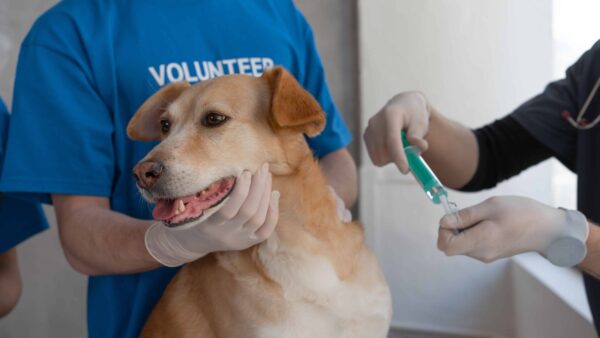If you are reading this article at the moment, there are chances that your dog has been diagnosed with pancreatitis.
This health condition always causes dogs severe pains, and it is also life-threatening especially when not taken care of properly.
After proper review from qualified veterinarians, we have decided to publish this article to enlighten concerned pet owners on how they can comfort dogs suffering from pancreatitis.
However, before we delve into the main topic. I want to draw your attention to some important information.
A dog diagnosed with pancreatitis should be hospitalized because veterinarians usually use intravenous (IV) therapy to treat this sickness. Therefore, the suggestions that will be listed below are for dogs that have received adequate treatment and are now deemed to recover at home.
With that being said. Let’s get into the main reason for this article!
What is Pancreatitis in Dogs?

Pancreatitis is a condition characterized by inflammation of the pancreas in dogs.
The Pancreas is an organ located beside the stomach of a dog. It secretes digestive enzymes that help break down food in the alimentary tract of dogs.
This organ is also capable of producing insulin which helps your dog regulate the amount of sugar in its blood.
In a healthy dog, once the pancreas secretes digestive enzymes, the enzymes are inactive until they enter the small intestine where they become active.
However, in a dog suffering from pancreatitis, the digestive enzymes secreted become active immediately after they are produced, and this usually leads to continuous inflammation of the pancreas and damage to the surrounding organs.
What are the Common Causes of Pancreatitis?
Pancreatitis in dogs can be triggered by various factors, and understanding the causes is crucial for effective prevention and management.
Here are some of the primary causes of pancreatitis in dogs:
1. High Fat Diet
One of the leading causes of pancreatitis in dogs is dietary carelessness. Many pet owners are fond of feeding their dogs high-fat foods such as fatty meats, porks, fried foods, or table scraps. When dogs eat excessive amounts of fat, it overworks their pancreas, and this will further lead to inflammation of the pancreas (Pancreatitis)
2. Obesity
Obesity is a significant risk factor for pancreatitis in dogs. Dogs that are overweight or obese have a higher likelihood of developing this condition. The excess body fat can disrupt normal pancreatic function, increasing the risk of inflammation.
3. Certain Medications
Some medications, including certain antibiotics, immunosuppressants, and chemotherapy drugs, have been associated with pancreatitis in dogs. These drugs affect the rate at which the pancreas works. When your dog is on medication, it is essential to follow the prescribed dosage and consult with your veterinarian when you notice any abnormal change in behavior to minimize the risk.
4. Genetic Predisposition
Certain dog breeds have a genetic predisposition to pancreatitis. Breeds such as Miniature Schnauzers, Yorkshire Terriers, and Cocker Spaniels are known to have a higher incidence of pancreatitis. If you have a dog from one of these breeds, it’s crucial to be extra vigilant and take preventive measures.
5. Trauma or Surgery
The Pancreas is present in the abdominal region of dogs. Therefore, physical trauma or recent abdominal surgery can potentially trigger pancreatitis in dogs. Any injury or surgical procedure in the abdominal area can disrupt the normal functioning of the pancreas and lead to inflammation.
6. Underlying Health Conditions
Certain underlying health conditions, such as diabetes mellitus, hyperlipidemia (elevated blood lipid levels), and hypothyroidism, can increase the risk of pancreatitis in dogs. It is important to manage these conditions effectively to minimize the likelihood of pancreatitis.
What are The Symptoms of Pancreatitis in Dogs

As a pet owner, you should be very observant. Early detection of pancreatitis is crucial for effective management.
Always take note of behavioral changes in your dog. Once you notice any change, consult with your veterinary doctor immediately.
Pancreatitis usually shows some outward visible signs in dogs. If you notice any of the signs that are listed below, your furry friend is likely suffering from pancreatitis.
Common symptoms of pancreatitis:
- Vomiting
- Diarrhea
- Abdominal Pain
- Dehydration
- Yellowing of skin and eye
- Loss of appetite
- Lethargy
How to Comfort a Dog with Pancreatitis
It is important to know that pancreatitis is not what you can cure by yourself at home. It is a health condition that needs the attention of a qualified vet.
However, even if it can’t be cured at home, you can help hasten the recovery of your dog by providing comfort for him.
Here are the top 4 ways to comfort dogs suffering from pancreatitis:
1. Feed Them with Low-Fat & Easy to Digest Foods

The aim is to avoid straining your dog’s pancreas and the only way you can achieve this is by feeding your dog only low-fat and easy-to-digest foods.
Get your dog some foods specially formulated for dogs with pancreatitis, these foods contain about 10% or less fat.
To promote the healing of the inflamed pancreas, you should feed your dog only foods that are easily digestible.
Avoid dog foods that contain fiber, corn, or soy. These foods may be too hard for your dog suffering from pancreatitis to digest.
You should also consider feeding your dog a little portion of food but frequently. Feeding them 4-5 times a day is decent enough to prevent overworking the pancreas. This means that you should avoid feeding your dog with a large portion of food at once.
You may also consider feeding your dog with homemade food. However, ensure the food has a very low quantity of fat.
Nutritious Homemade Food Recipe for Dogs with Pancreatitis
We have formulated a homemade food recipe designed to provide a nourishing and easily digestible meal for dogs with pancreatitis.
This food consists of lean protein, low-fat carbohydrates, and selected vegetables to support your dog’s health while minimizing strain on the pancreas.
Ingredients:
- 1 cup of skinless, boneless chicken breast (cooked and shredded)
- 1 cup of cooked white rice or sweet potatoes (mashed)
- 1/2 cup of green beans (steamed and chopped)
- 1/2 cup of carrots (cooked and mashed)
- 1/4 teaspoon of fish oil (optional, for added omega-3 fatty acids)
Instructions:
- Cook the chicken breast thoroughly until it is fully cooked and tender. Remove any skin and bones, and shred the meat into small, easily digestible pieces.
- Cook the white rice or sweet potatoes separately according to the package instructions. Mash the cooked rice or sweet potatoes to a smooth consistency.
- Steam the green beans until they are soft but still retain their color. Chop them into small pieces.
- Cook the carrots until they are soft and easily mashed.
- In a mixing bowl, combine the shredded chicken, mashed rice or sweet potatoes, chopped green beans, and mashed carrots. Mix them well to ensure an even distribution of ingredients.
- If desired, add a quarter teaspoon of fish oil to the mixture. Fish oil contains beneficial omega-3 fatty acids that can support your dog’s overall health.
- Once the ingredients are thoroughly mixed, allow the homemade food to cool before serving.
2. Creating a Calm Environment & Show Emotional Support
One of the ways to comfort dogs suffering from pancreatitis is to create a safe space for them where they can relax without disturbances.
Remove anything that can trigger fear or anxiety from your environment because, at that moment of recovery, your dog will benefit from a calm and stress-free environment.
If you are the type that loves to listen to loud music early in the morning or at any time, minimize doing that and avoid exposing them to stressful situations whenever possible.
Dogs with pancreatitis also benefit greatly from emotional support. Shower them with love, attention, and gentle affection.
Your presence and reassurance can provide a sense of comfort and security during their recovery.
3. Medications and Supplements

Work closely with your veterinarian to develop a suitable medication and supplement regimen for your dog.
Anti-nausea medications such as maropitant citrate may be prescribed to alleviate nausea.
Pancreatitis is also very painful, and your vet may have to prescribe some pain relief medication. These drugs will help your dog manage pain and reduce inflammation.
It is very important to manage your dog’s pain beforehand and not after it becomes extreme. You may also want to try a multimodal approach (Using multiple medications with distinct modes of action).
Your vet may also recommend some supplements for your dog.
Below are the most common supplements for dogs suffering from pancreatitis:
Digestive Enzymes
Digestive enzymes aid in the digestion and absorption of nutrients, which can be particularly helpful for dogs with compromised pancreatic function. These enzymes assist in breaking down fats, proteins, and carbohydrates, relieving some of the workload on the pancreas.
Omega-3 Fatty Acids
Omega-3 fatty acids, such as those derived from fish oil, have anti-inflammatory properties and can help support the overall health of dogs with pancreatitis. These fatty acids have been shown to reduce inflammation in various body systems, including the pancreas.
Spleen Treat
Spleen Treats are great when it comes to keeping the digestive tract in good condition. This treatment helps dogs suffering from pancreatitis, diarrhea, sensitive stomach, weight loss, etc.
Probiotics
Probiotics are beneficial bacteria that promote a healthy balance in the gut. They can help improve digestion, support the immune system, and enhance overall gastrointestinal health. Dogs with pancreatitis may experience imbalances in gut bacteria, and probiotic supplements can help restore and maintain a healthy gut environment.
Harmonize Liver Supplement
Pancreatitis stresses the liver. However, liver supplements will help induce the production of digestive enzymes and probiotics that aids digestion.
Vitamin B Complex
Pancreatitis can sometimes lead to deficiencies in certain vitamins, including B vitamins. Vitamin B complex supplements can help replenish these essential nutrients. B vitamins are involved in energy metabolism, nerve function, and the production of enzymes necessary for proper digestion. By ensuring an adequate supply of B vitamins, these supplements can support the dog’s overall health and well-being.
Antioxidants
Antioxidants, such as vitamin E and vitamin C, can help reduce oxidative stress and inflammation in dogs with pancreatitis. Pancreatitis can lead to an increase in free radicals, which can damage cells and exacerbate inflammation. Antioxidant supplements help neutralize these harmful free radicals, protecting the cells from damage and promoting healing.
4. Regular Veterinary Check-ups

During periods of recovery, regular veterinary check-ups are crucial for dogs with pancreatitis.
Schedule routine visits to monitor their condition and make necessary adjustments to their treatment plan if needed.
Your veterinarian will guide managing pancreatitis and ensure your dog’s well-being. He will also recommend a specialized diet tailored to your dog’s nutritional needs.
Conclusion
As responsible pet owners, we should always be ready to provide our pets with care and comfort when they are sick.
Pancreatitis is a very common health condition in dogs, it may be caused by high-fat food intake, obesity, trauma, or even genetic predisposition.
However, when your dog is diagnosed with pancreatitis, you should not leave the work alone for your vet. You should also be ready to provide comfort for your dog.
By applying the strategies in this article, you can comfort dogs with pancreatitis and also improve their overall quality of life.
FAQs
Can pancreatitis in dogs be cured?
Yes, pancreatitis can be cured in dogs. However, the period with which it will be cured depends on the severity.
If acute pancreatitis is detected on time in your dog, it can easily be cured within 2 – 4 days.
However, if the pancreatitis is chronic, it might take a longer time to be cured.
Pancreatitis can also recur in dogs after it has been diagnosed and cured before, this is why you have to keep your dog on a low-fat diet.
Is pancreatitis in dogs contagious?
No, pancreatitis is not contagious. It is an individual health condition and cannot be transmitted to other dogs or humans.
Is Diabetes Related to Pancreatitis?
Yes, both diabetes and pancreatitis are diseases of the pancreas. It is not uncommon seeing a dog with diabetes later develop pancreatitis.
Which Dogs Breeds are more Prone to having pancreatitis?
If you are planning to adopt a new dog, you may need this information. Pancreatitis may be caused by genetic predisposition.
With that being said, some dogs are prone to having these diseases as a result of genetics and how they are built.
Here are the breeds prone to having pancreatitis:
- Giant Schnauzers
- Yorkshire Terriers
- Miniature Schnauzers
- Cocker Spaniels
- Miniature Poodles
- Dachshunds
Can pancreatitis be cured at Home?
No, pancreatitis is a life-threatening disease. Once your dog is diagnosed, he should be hospitalized and taken care of by a qualified vet.







Leave a comment